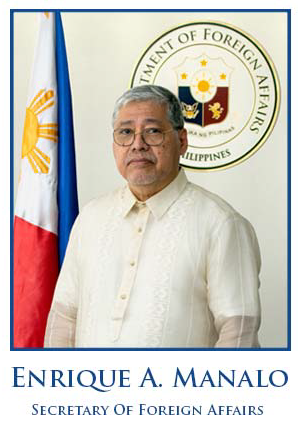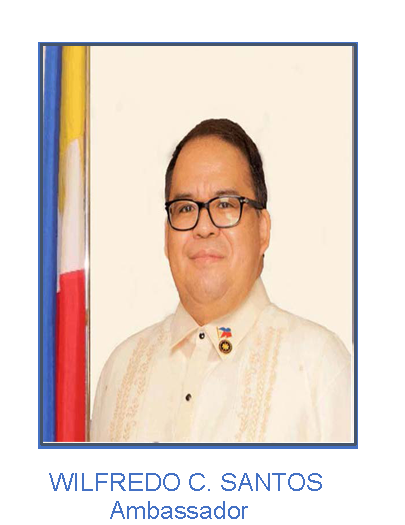A Filipino citizen who intends to marry a foreigner should first determine with the appropriate civil or religious authority what the documentary requirements are under the marriage laws in the country where the marriage will take place.
The foreign contracting party (especially if not a citizen of the country where the marriage will take place) should also ensure that proper documentary requirements that apply to him or her are complied with to avoid any delay in the intended marriage.
Both contracting parties must inquire first with the local civil and/or religious authorities empowered to solemnize marriages on the local requirements and procedures before coming to the Embassy's Consular Section.
Requirements
In most countries, a Filipino citizen has to prove that he or she has the legal capacity to contract marriage. To substantiate this declaration under oath, the following are to be submitted to the Consular Section:
- Philippine passport as proof of Philippine citizenship;
- Birth Certificate issued by the National Statistics Office (NSO) on security paper and authenticated by the Department of Foreign Affairs as proof that Filipino citizen is at least eighteen (18) years of age;
- Certificate of No Marriage Record (CENOMAR) also issued by the NSO and authenticated by the DFA;
- Two (2) identical 3.5 cm x 4.5 cm photos that comply with the following:
- taken with white background
- taken within last six (6) months
- showing full front view of applicant's face
- applicant in decent attire (with collar and sleeves);
- preferably without glasses (or if with glasses, must have no reflections);
- male applicant should have no earrings
- Additional requirements for special cases
- Court Decision on Annulment for any contracting party who was previously married and whose marriage was subsequently annulled by a Philippine court (copy of court decision with NSO-registered marriage contract containing marginal note regarding annulment and also authenticated by the DFA);
- Death Certificate of deceased spouse for any contracting party who is a widow or widower (must also be NSO-issued and DFA-authenticated).
- Affidavit of Consent executed by the father, mother, surviving parent or guardian, or person having legal charge of any contracting party who is between the ages of eighteen (18) and twenty-one (21), pursuant to Article 14 of the Family Code of the Philippines;
- Affidavit of Parental/Guardian Advice upon the intended marriage executed by any parent or legal guardian of any contracting party who is between the ages of twenty-one (21) and twenty-five (25), pursuant to Article 15 of the Family Code of the Philippines.
- For the foreign contracting party
- Photocopy of passport and/or national identification card; and
- Document attesting to legal capacity to contract marriage issued by the relevant civil authority of his or her country and authenticated by the Ministry of Foreign Affairs and the Embassy/Consulate of foreign contracting party in Jordan;
- Written consent of first wife (if foreign contracting party is a previously married Muslim man) duly notarized and authenticated by the Ministry of Foreign Affairs and/or Embassy of foreign contracting party in Jordan; and
- Two (2) identical photographs (3.5cm x 4.5cm) of foreign contracting party
Procedures
If the Filipino contracting party has complied with the documentary requirements specified above, he or she can then obtain a Certificate of Legal Capacity to Contract Marriage by following the procedures below:
- Execute an affidavit on his or her legal capacity to contract marriage, which declares under oath all relevant personal circumstances and requests the issuance of the Certificate of Legal Capacity to Contract Marriage (LCCM);
- Submit to the Consular Section the requirements for the foreign contracting party as specified above;
- The Consular Section shall post the particulars of the Filipino contracting party requesting the LCCM and that of the foreign contracting party on the bulletin board of the Embassy for ten (10) consecutive days; and
- After the prescribed publication period has lapsed, and if no information is received pertaining to possible impediments or disqualifications, the Consular Section shall then issue the Certificate of Legal Capacity to Contract Marriage.
Note: The Certificate of Legal Capacity to Contract Marriage is only valid for a period of one hundred and twenty (120) days and shall be deemed automatically cancelled after this period has lapsed




 PH Embassy, MWO-Jordan, Conduct Orphanage Visit
Upper Left Photo, L-R: Representatives of the PH Embassy in Amman and Migrant Workers Office (MWO)-Jordan with Dr. Sana Al-Nuaimat, Director at the Al Hussein Social Center for Orphans (center) during a visit to the non-marital Filipino children at the facility on 16 April 2025 in Amman, Jordan –Photos by Amman PE
AMMAN, 16 April 2025 -...
PH Embassy, MWO-Jordan, Conduct Orphanage Visit
Upper Left Photo, L-R: Representatives of the PH Embassy in Amman and Migrant Workers Office (MWO)-Jordan with Dr. Sana Al-Nuaimat, Director at the Al Hussein Social Center for Orphans (center) during a visit to the non-marital Filipino children at the facility on 16 April 2025 in Amman, Jordan –Photos by Amman PE
AMMAN, 16 April 2025 -... 




